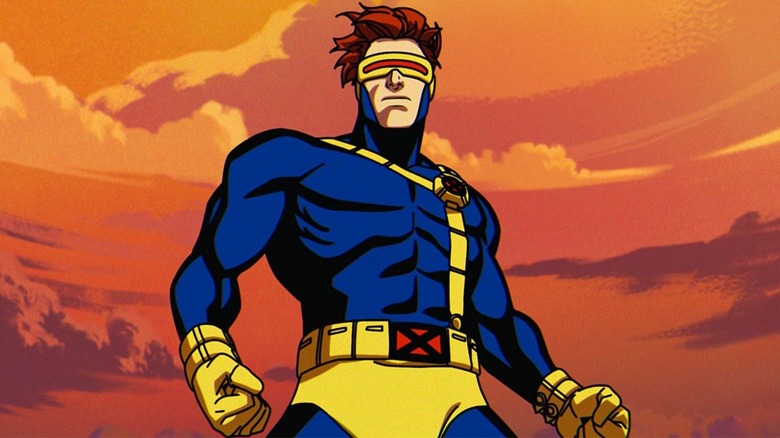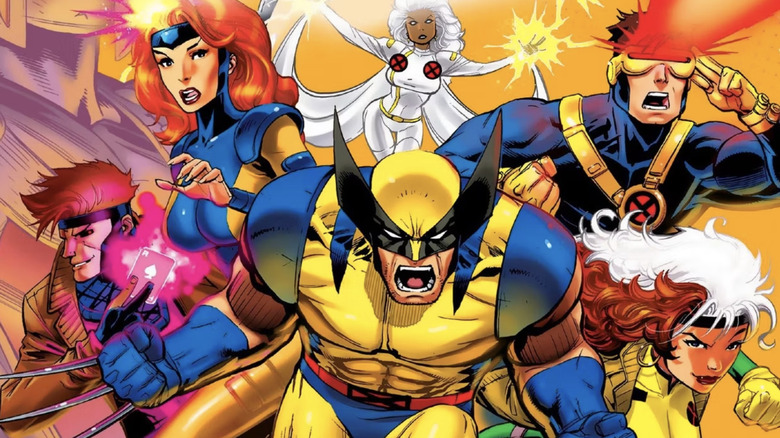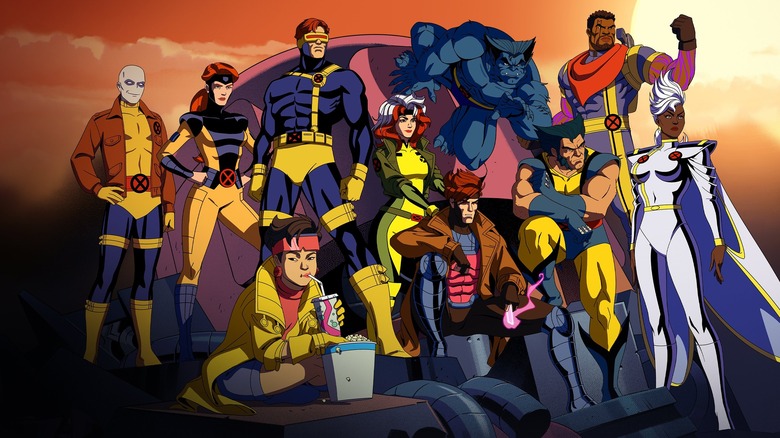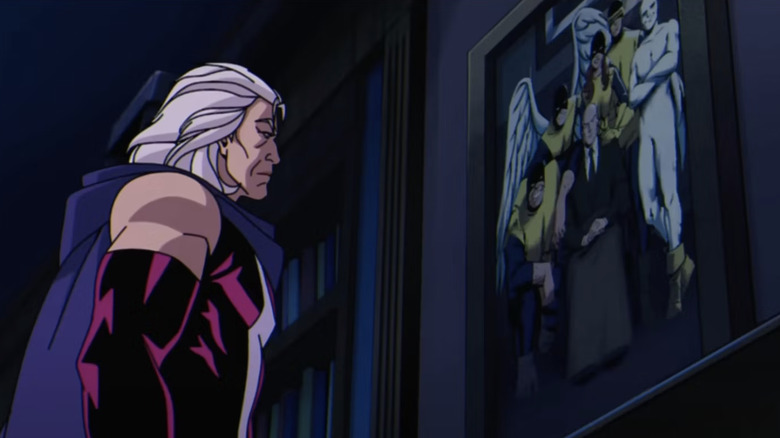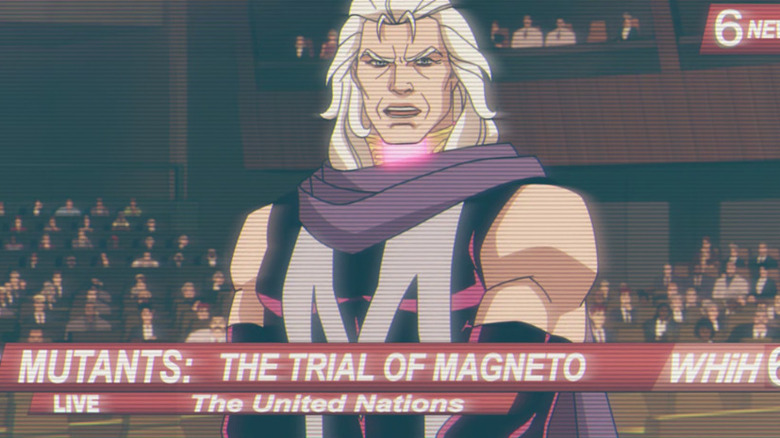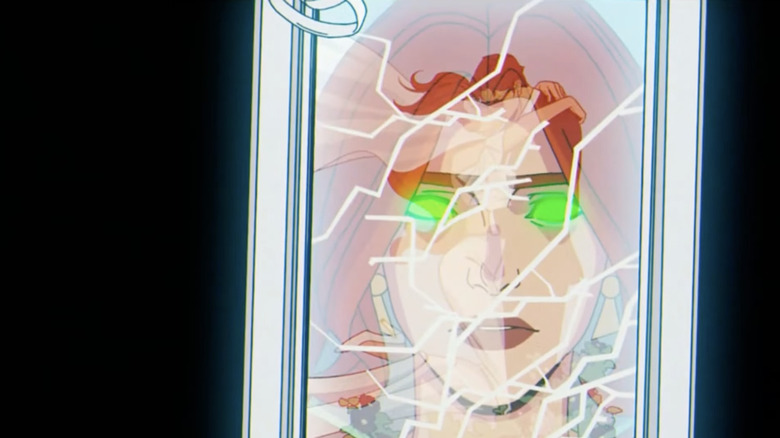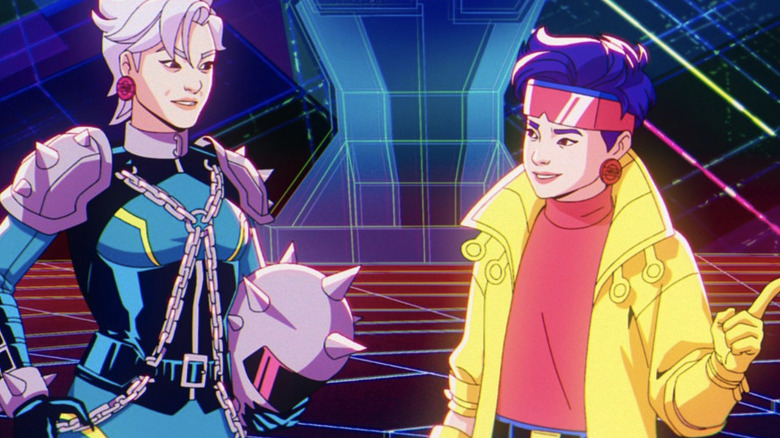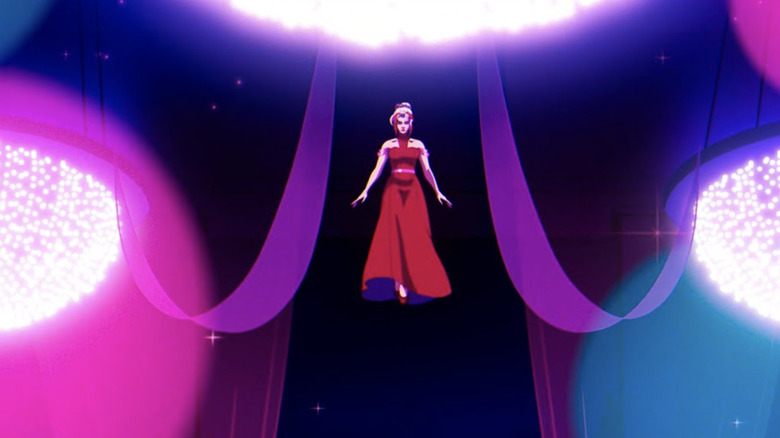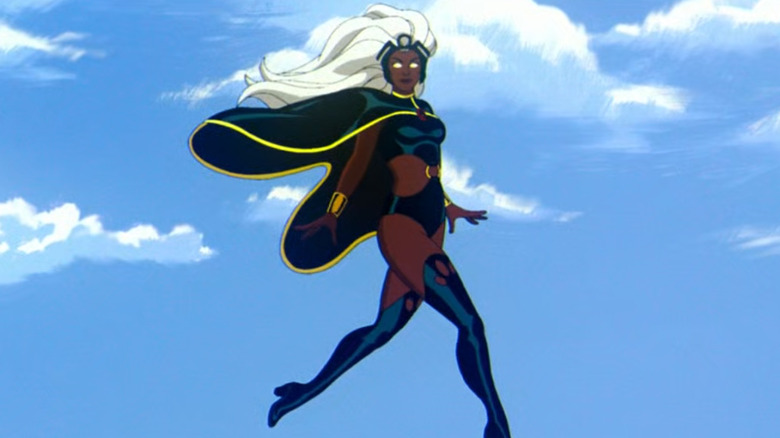The Highest Rated Marvel Project On Rotten Tomatoes Isn't Even A Movie
For a long while, the Marvel Cinematic Universe had a reputation for not only producing smash successes at the box office, but movies that scored "Fresh" on review aggregate site Rotten Tomatoes too. This set the MCU apart from its competitors like the DC Extended Universe, which earned marks as erratic as the movies themselves, and the routinely-panned "Transformers" films.
Marvel Studios President Kevin Feige is proud of the MCU achieving critical success alongside its commercial strides. As he told Vanity Fair in 2017:
"[Rotten Tomatoes sends] this little Lucite, certified fresh thing with the name of the movie on it. We got them lined up around here. We take pride in it. There are cases where audiences and critics are not aligned. But I think, for the most part, they are, and I like it when people like our movies."
(Interviewer Joanna Robinson later used this as a small piece of her research for the behind the scenes book "MCU: The Reign of Marvel Studios," co-authored with Dave Gonzales and Gavin Edward. Read /Film's interview with them here.)
Alas, since 2017, Marvel Studios' tomatoes are no longer all bright red. 2021's "Eternals" was "Rotten" at 47%, as was "Ant-Man and the Wasp: Quantumania" at 46%. 2024, though, saw the studio's highest rated project yet: animated series "X-Men '97," a revival of the classic 1992 "X-Men" cartoon (with much of the original cast on board). As of now, the show has a near perfect 99% on Rotten Tomatoes, higher than the 98% that MCU TV series "Ms. Marvel" earned in 2022. Likewise,"Black Panther," the highest rated MCU movie on Rotten Tomatoes, has only 96%.
Does the show earn this hype? You bet it does. It's called "X-Men '97" because of the year it takes place in — but also because if I was grading it, that's the score it would get! (I kid, I kid — not really.)
Why reboot the original X-Men cartoon?
I was seriously skeptical of "X-Men '97" when it was first announced back in 2021. I love "X-Men" comics, but I was never the biggest fan of the original show. Reviving this old series instead of making a new "X-Men" cartoon, especially when the 1992 series got a fine send-off with "Graduation Day"? It seemed creatively bankrupt.
When the show finally premiered this past March, the first episode "To Me, My X-Men" seemed to confirm the series was a nostalgia gambit — that's what /Film's own review called it. The episode climaxes with the team fighting Sentinels, including moments like Rogue ripping off one of the robots' heads then shouting "Head's up!" or Gambit kinetically-charging up Wolverine's claws. Fun, sure, but not much removed from the Saturday morning cartoon feel of the original.
Thankfully, it became clear that the basic, "X-Men crash-course" feel of episode 1 was just table-setting. "X-Men '97" is a show that had grown up with its audience (literally because creator Beau DeMayo watched the original show as a child). The most obvious nostalgia in "X-Men '97" is how it recreates the 1992 "X-Men" theme song and title sequence; each episode opens with the same sounds '90s kids associate with "X-Men." In the original show, the title sequence remained static. In "X-Men '97," it is constantly changing, whether due to team line-up changes or to best reflect the episode it precedes. This is television that will acknowledge tradition without binding itself to it.
X-Men '97 is even better than the Marvel comics it adapts
As "X-Men '97" unfolded episode by episode, I realized using the old show as a basis was advantageous to the story and not just nostalgic.
Since the main cast was already established five seasons ago, "X-Men '97" could hit the ground running. It only needed one episode to set itself up, not a whole season of introductions. Likewise, when you're adapting "X-Men," there's always pressure to do the most famous stories: "The Dark Phoenix Saga," "Days of Future Past," etc. "X-Men '97" doesn't have that burden because the original show already adapted those stories. It thus has the room to dig deeper into "X-Men" history, which is how a more obscure villain like Bastion ascended to be the first season's big bad.
Speaking of: the 1990s was the decade when the X-Men were their most ubiquitous, both because of the cartoon's success and the bloat of comic spin-offs ("X-Factor," "X-Force," "Generation X," etc.). This makes it easy to forget the decade was not a quality watermark. Storylines like "Onslaught" or Bastion's introduction, "Operation: Zero Tolerance," are not fan-favorites. Others, like "Fatal Attractions," are remembered more for flash than the story and character depth that writer Chris Claremont brought to "X-Men" in the '70s and '80s.
And yet, "X-Men '97" takes these threads and spins gold. It does what the original show didn't and improves on its source material. I'd never recommend someone watch the animated "Dark Phoenix Saga" from "X-Men" season 3 instead of just reading the comic, but "X-Men '97" clears the dregs of '90s "X-Men" stories.
Magneto, and tolerance, are on trial in X-Men 97
While it's only been a few months since I saw it, I still remember how episode 2 of "X-Men '97" — "Mutant Liberation Begins" — hooked me. It's all thanks to the most compelling anti-hero in all of comics: Magneto.
You might remember how at the end of the original "X-Men" series, an ill Professor X/Charles Xavier departed Earth with his alien paramour, Lilandra, to seek treatment in the Shi'ar empire. "To Me, My X-Men" ends by revealing Xavier bequeathed his mission not to his students but his best frenemy, Magneto. "Mutant Liberation Begins," loosely adapting "The Trial of Magneto" ("Uncanny X-Men" #200 by Claremont and John Romita Jr.), tests Magnus' commitment to his old friend's dream.
Xavier and Magneto's conflicting ideologies about mutant survival have always been the most fertile ground, narratively and thematically, for "X-Men" writers to plow. This episode is no different; chained before the United Nations, Magneto uses the chance to preach, saying he has only ever acted in self-defense: "In history's sad song, there is a refrain. Believe differently, love differently, be of different sex or skin, and be punished. [...] You claim justice is overdue, but so is healing."
The moment X-Men '97 won me over
After an anti-mutant mob attacks the trial, robbing Storm of her mutant gifts along the way, Magneto still shows mercy to his attackers and judges:
"Charles Xavier entrusted me with his dream and it does not ask you to love or embrace my kind as your own, but merely to accept that this is a shared world with a common future, and that my kind — like yours — have the right to live in it. I am trying to be better. Please... do not make me let you down."
Breathtaking writing, plain and simple. As the kids say, DeMayo did not have to go that hard — but I'm so glad he did. Like the UN officers realizing Magneto isn't going to kill them, this speech is when I realized my mutants were in safe hands. Even better, Magneto's speech cross-cuts with Jean Grey giving birth to her and Cyclops' son, Nathan; a speech about mutantkind's struggles and future is intertwined with a scene introducing that future's seed. That kind of keen visual storytelling is, frankly, rare in the MCU.
From Magneto's provocative words (which were allegorical but all-too-true) to the mob being an implicit allusion to the January 6, 2021 attack on the U.S. Capitol, it became clear "X-Men '97" was not pulling its punches.
A mutant soap opera in Fire Made Flesh
After the political overtones of "Mutant Liberation Begins," "X-Men '97" episode 3, "Fire Made Flesh," pivots into fantasy. The "Jean Grey" who birthed Nathan discovers she is a clone, one crafted by Mister Sinister to infiltrate the X-Men. Jean 2.0 dubs herself the Goblin Queen and lets loose hellish psychic visions on the X-Men.
If this sounds sillier than the previous episode, then remember: "X-Men" is a superhero comic, not a polemic. "Fire Made Flesh" honors the fantastical side of the comics by adapting Claremont and Louise Simonson's crossover event "Inferno." The atmosphere in the episode is unrivaled, from Sinister's gothic "Frankenstein" styled laboratory to the cathedral where the X-Men face the Goblin Queen. The demons in the episode are just as creepy as those drawn by Marc Silvestri in "Inferno," with the added bonus of slithering and shapeshifting thanks to the motion of animation.
Speaking of, the clash between Magneto and the Goblin Queen, where they both use the stained glass of the cathedral as telekinetic ammo, stands up as one of season 1's best action scenes. It's not the only barbs they trade; the Goblin Queen also drops some kinky lines about wanting Magneto "as a toy" and then kisses Cyclops with her own blood as lipstick.
The MCU is infamously sexless, which is just another example of how its heroes don't feel like real people with genuine problems and emotions. "X-Men '97" is the cure to that; from the Goblin Queen's presence to cracks about Rogue testing her stamina in Danger Room sessions with Magneto, the show honors the psychosexual imagery of Claremont's comics.
"X-Men" is a soap opera, and what's a soap opera worth without sex?
How X-Men '97 remembers to be episodic
"Fire Made Flesh" condenses the spanning "Inferno" into a single half-hour episode; in the comic, the Goblin Queen lets loose a whole Hellish invasion on New York City, not just the X-Mansion. In doing so, the episode shows the double-edge of "X-Men '97" remembering to be episodic.
"X-Men '97" episode 4 is bifurcated. Part 1, "Motendo," is about Jubilee's 18th birthday. She winds up sucked into a video game world designed by interdimensional alien Mojo. Faced with the chance to relive the old days forever, she instead learns from a familiar face to build her own future instead of getting trapped in the past. This is a standalone story (some, not me, might call it "filler") that advances the show's themes but not its story. And it's great! The original "X-Men" was relatively serialized but as a '90s children's cartoon, it still had standalone episodes.
However, the other half of episode 4 is totally disconnected from the first. "Lifedeath — Part 1" is about Storm dealing with the loss of her power and her romance with mutant inventor Forge. This episode ends on a cliffhanger, picked up in episode 6, "Lifedeath — Part 2," where Storm gloriously regains her powers. And yet, half of "Lifedeath — Part 2" also reintroduces Professor X, currently set to become emperor of the Shi'ar.
These three stories all feel like they could've been episodes on their own. As animation expert Adam Wescott noted on his newsletter Aniwire, "X-Men '97" falls into the streaming era pit of shorter seasons and a need that each episode feed into the next.
The scenes of the "X-Men '97" mid-section are all right. The structure, while not debilitating, is peculiar.
Remember It changed everything on X-Men 97
The episode of "X-Men '97" that everyone will recall is, amusingly enough, episode 5, "Remember It." Why? Because mutant nation Genosha is built up as a paradise in the first half (Ace of Base's "Happy Nation" is brilliantly needle-dropped for a charged Rogue/Magneto hovering slow-dance). Then, Bastion's Sentinels bomb this "happy nation" to ash in the episode's second half. This is the episode that showed why "X-Men '97" was rated TV-14; not only are mutant redshirts fried, but Gambit is skewered by Master Mold and gives his life to destroy the android. The episode concludes with a sobbing Rogue cradling his corpse: "Sugar... I can't feel you..."
The episode adapts Grant Morrison and Frank Quitely's 2001 "X-Men" comic "E is for Extinction." The result proves that (a.) "X-Men '97" wouldn't only adapt '90s comics and (b.) it wouldn't present easily-solved dilemmas. In the series' first half, mutant tolerance seemed to be moving forward in a positive direction, so the second half is all about what happens when things not only reverse, but get even worse. Some, like Magneto and Rogue, decide enough is enough.
DeMayo has shared how he conceived the show's structure, including its shocking midpoint, to shatter built-up "X-Men" nostalgia and force the characters to grow up. The Genosha massacre made the world feel much less safe, just like how the American kids who watched "X-Men" during its original run felt after 9/11.
Why X-Men '97 is the best Marvel project in years
What's the biggest break between the MCU and "X-Men '97"? It's how the characters talk. In "X-Men '97," the characters speak "Claremontese," named for the writer's lush, loquacious prose that he deployed in both his comics' narration and dialogue. Realistic? No, but it's so refreshing compared to the self-mocking snark of Marvel movies. "X-Men '97" asks that you engage with its characters earnestly but it doesn't drag them all the way down to Earth in the process.
Despite the heightened dialogue, the show maintains each character's unique voice: Rogue and Gambit are flirty, Jubilee is spunky, Wolverine is sardonic and grouchy, Magneto is verbose, Jean is motherly, and Cyclops is commanding and to the point. Beast talks like an English professor, Nightcrawler like a priest, and Storm like a goddess. "X-Men '97" understands it characters so well it even won me over to parts of the "X-Men" canon I've always found questionable, like Rogue's romance with Magneto or Cable's convoluted history as the time-traveling son of Cyclops and Jean.
Of course, writing is just half of it with the X-Men; they were first drawn in a visual medium and that's where they and their colorful costumes belong. I remember dreading that the show would be rendered in CGI, a la Marvel's "What If...?" Nope; instead, it's 2-D but with all the roughness of the original series smoothed over (courtesy of Studio Mir, famous for animating "The Legend of Korra").
After that spectacular first season, I think "X-Men '97" could run for 97 more years and still keep me hooked.
"X-Men '97" season 1 is streaming on Disney+. The show has been renewed for seasons 2 and 3.
